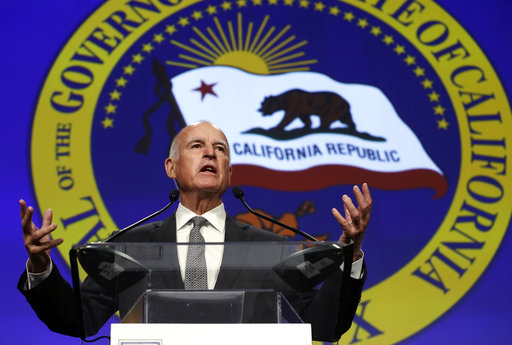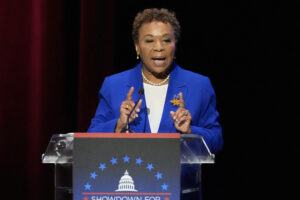Brown Signs 7 California Bills Targeting Workplace Sexual Harassment
The measures ban secret contracts that keep victims quiet, mandate anti-harassment training and require that corporations include women on their boards. Gov. Jerry Brown addresses the California Chamber of Commerce in 2015. (Rich Pedroncelli / AP)
Gov. Jerry Brown addresses the California Chamber of Commerce in 2015. (Rich Pedroncelli / AP)
On Sunday, nearly a year after news reports first detailed multiple allegations of sexual abuse against film producer Harvey Weinstein, California Gov. Jerry Brown signed seven bills that address sexual harassment in the workplace. The legislation also encompasses issues such as victim intimidation and retaliation as well as gender disparity. California industry groups lobbied against several of the measures.
These are the bills Brown signed:
- SB 1300 by Sen. Hannah-Beth Jackson (Democrat) prohibits companies from using non-disparagement clauses, which companies sometimes insert in contracts when an employee is hired or promoted. It also broadens the definition of harassment to cover anything that will “affect the victim’s ability to perform the job as usual, or otherwise interfere with and undermine the victim’s personal sense of well-being.”
- SB 826 by Jackson and Toni Atkins (D) requires that publicly traded corporations include women on their boards or face fines.
- SB 820 by Sen. Connie Leyva (D) bans the use of secret settlements and nondisclosure agreements to keep victims quiet.
- SB 1343 by Sen. Holly Mitchell (D) requires that companies with five or more employees provide training against sexual harassment.
- AB 1619 by Assemblyman Marc Berman (D) gives victims 10 years—extended from three—to seek damages after a sexual assault.
- SB 419 by Sens. Anthony Portantino (D) and Leyva is framed as whistleblower protection. It forbids the Legislature to retaliate against a lobbyist or employee who files a harassment complaint.
- SB 224 by Jackson specifies that elected officials, lobbyists, investors, directors and producers must follow state anti-harassment guidelines.
A number of related bills are waiting on Brown’s desk:
- AB 1870 by Assemblywoman Eloise Gomez Reyes (D) extends the period from one to three years that a person has to file a discrimination or harassment complaint.
- AB 2079 by Assemblywoman Lorena Gonzalez Fletcher (D) would require anti-harassment training for janitorial workers.
- AB 3080 by Gonzalez Fletcher bans forced arbitration agreements for claims about wages, harassment, retaliation and discrimination.
Adama Iwu, who has worked to expose sexual harassment in California government, and actor Rosanna Arquette, who was one of the first women to speak publicly about having been sexually harassed by Weinstein, wrote in support of SB 1300. “The bill corrects subtle but significant flaws in our state’s sexual harassment laws. One aspect in particular targets the heart of what this movement has been about: breaking the silence,” they wrote in The San Francisco Chronicle.
“Some workers find that they have signed a ‘release of claims’ agreement that effectively stripped them of any right to pursue sexual harassment claims. Faced with this reality, we ask: What purpose do our laws serve if they can simply be signed away?” Iwu and Arquette wrote.
“California is stating clearly that we believe and support victims,” Sen. Jackson said in a statement.
Still, California industry groups have tried to stop a handful of the bills, claiming that the legislation might hurt workers.
More than 50 industry groups signed a letter in opposition to SB 1300, writing that they take issue with the expanded definition of harassment. “These provisions will significantly increase litigation against California employers and limit their ability to invest in their workforce,” they wrote in the letter.
According to state lobbying filings, the California Chamber of Commerce lobbied on SB 1300 and SB 820. It also lobbied against Assembly bills AB 1870, AB 2079 and AB 3080.
“As employers, you want to protect your workforce and the employees that you have working for you,” said the chamber’s Jennifer Barrera. She said new potential mandates and litigation are “what is concerning to employers, who are trying to do the right thing but nonetheless could wind up facing a lawsuit in court.”
The California Restaurant Association, which signed the letter against SB 1300, lobbied on SB 1300, SB 820 and SB 1343. It also lobbied against anti-harassment bills AB 1870, AB 2079 and AB 3080.
The National Federation of Independent Businesses lobbied on SB 1300, as well as AB 1870, AB 2079, SB 1343 and AB 3080.
John Kabateck of the National Federation of Independent Businesses, in a written statement, expressed his opposition to the proposed ban on forced arbitration agreements: “It not only creates massive confusion for employers attempting to comply with the law, but it also creates immense opportunity for trial lawyers to sue.”
Many California workers, however, are ready for concrete change that could hold businesses and institutions with cultures of abuse accountable. Actor Mira Sorvino, one of the first women to accuse Weinstein of sexual violence, urged Brown to sign AB 1870, SB 224, SB 1343, SB 1300 and AB 3080.
Sorvino wrote in The Los Angeles Times: “Every time a predator is held accountable, it shows the public’s hunger to stop the gross injustices of sexual harassment, abuse and rape. But when the dust settles, will corporate culture, the entertainment industry, the political arena and religious institutions go back to business as usual—protecting their bottom lines and reputations, silencing victims, keeping abusers in play.”
Your support matters…Independent journalism is under threat and overshadowed by heavily funded mainstream media.
You can help level the playing field. Become a member.
Your tax-deductible contribution keeps us digging beneath the headlines to give you thought-provoking, investigative reporting and analysis that unearths what's really happening- without compromise.
Give today to support our courageous, independent journalists.






You need to be a supporter to comment.
There are currently no responses to this article.
Be the first to respond.